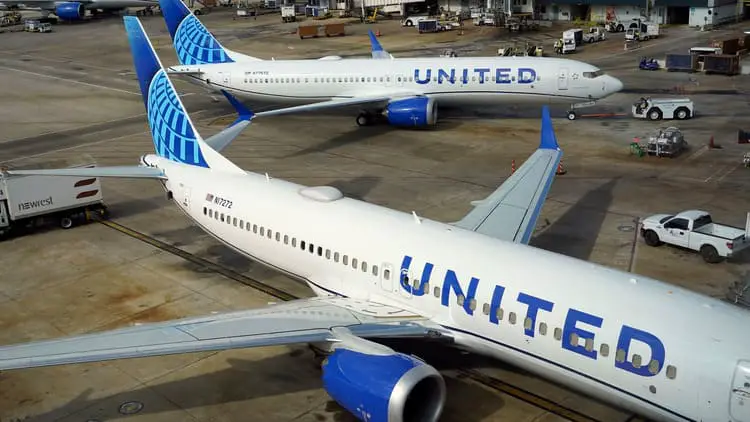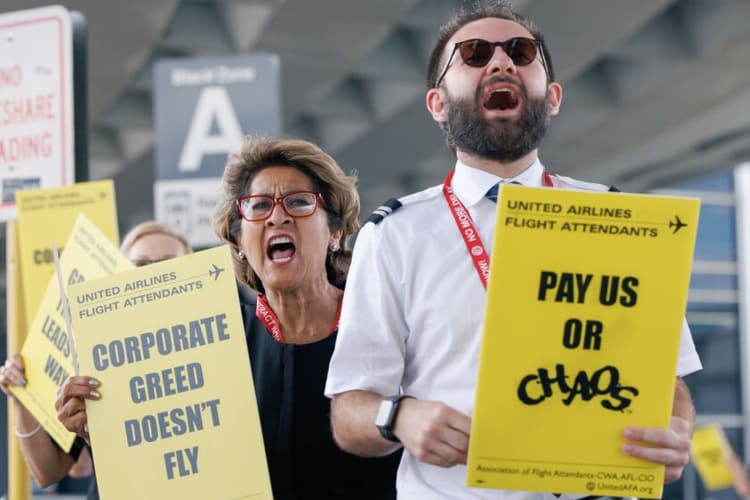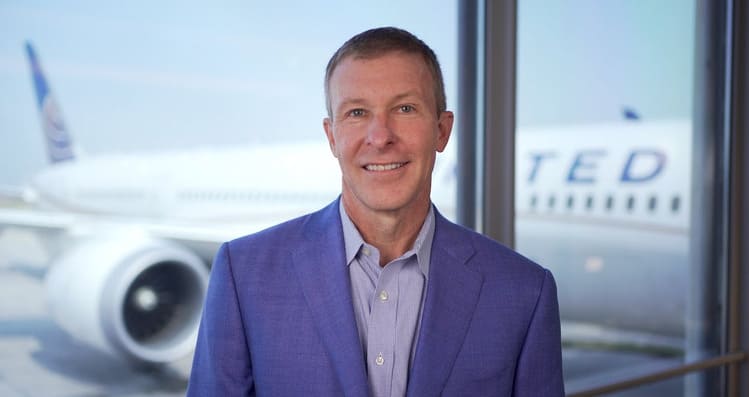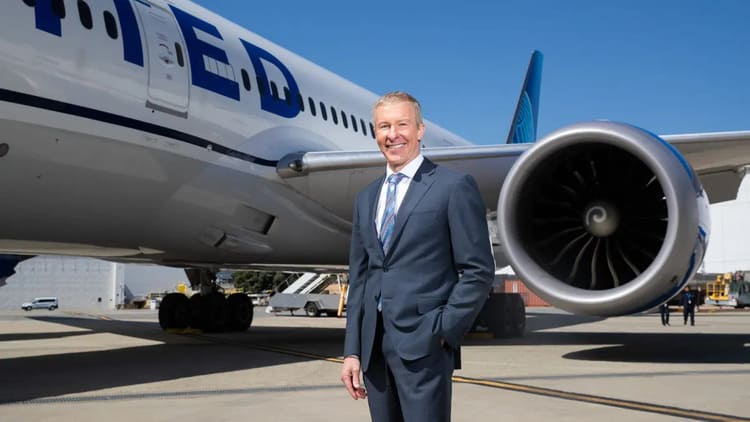In 2024, United Airlines CEO Scott Kirby earned $33.9 million in total compensation, making him the highest-paid airline CEO in the United States.
His earnings were higher than those of his peers at Delta, American, or Southwest—and they’ve raised a few eyebrows.
Kirby’s paycheck represents a significant jump from what he earned just a year earlier. In fact, his compensation has more than tripled since 2022.
And most of it comes from stock and performance-based rewards, not just a salary.
Let’s take a closer look at what he earned, why it’s so high, and what people are saying about it.
Breaking Down the $33.9 Million

Here’s how Scott Kirby’s pay looked in 2024:
- Base salary: $1.2 million
- Bonus: $3 million
- Non-equity incentive pay: $5.1 million
- Stock awards: $24.4 million
- Total compensation: $33.9 million
In simple terms, Kirby made most of his money from company stock. That means when United Airlines does well on the stock market, his earnings go up—sometimes a lot.
This kind of pay structure is common for big CEOs. It’s meant to reward leaders who help grow the company and make shareholders happy.
But it also means their earnings can get very large, very fast.
How Kirby Compares to Other Airline CEOs
Let’s see how the other top airline CEOs did in 2024:
| Airline | CEO Name | Total Compensation |
| United Airlines | Scott Kirby | $33.9 million |
| Delta Air Lines | Ed Bastian | $27.1 million |
| American Airlines | Robert Isom | $15.6 million |
| Southwest Airlines | Bob Jordan | $10.6 million |
As you can see, Kirby earned over $6 million more than Ed Bastian at Delta—and more than three times the amount Southwest’s Bob Jordan made.
Why the Big Jump?
From 2020 to early 2023, airline CEOs had limits on their pay.
This was part of the U.S. government’s COVID relief plan, known as the CARES Act. Airlines that got help from the government had to agree to cap executive pay.
Those limits ended in April 2023. So 2024 was the first full year airline companies could pay their CEOs whatever their boards approved.
Kirby’s pay went from $9.8 million in 2022 to $18.6 million in 2023—and then up again to $33.9 million in 2024.
That’s a fast climb.
And it shows how quickly things have returned to normal—or even better than normal—for the people at the top.
What Supporters Say
Supporters of Kirby’s pay say he earned it.
In their view, he helped guide United Airlines through one of the toughest periods in the industry’s history—and came out stronger on the other side.
Since taking over as CEO in 2020, just as the COVID-19 crisis hit, Kirby has led bold efforts to stabilize and grow the airline.
In 2024 alone, United launched dozens of new routes, expanded international service, ordered hundreds of new planes, and posted strong profits.
The company also improved its operational reliability, winning back both passengers and investor confidence.
And that investor confidence matters.
As United’s stock price rose throughout 2024, so did the value of the performance-based stock awards that make up the bulk of Kirby’s pay package.
That’s by design, supporters argue—it means his financial success is directly tied to how well the company does.
They also note that most of Kirby’s compensation is what’s called “at-risk pay.”
In other words, it’s not guaranteed.
If United doesn’t meet performance goals or the stock slumps, those earnings shrink dramatically.
This structure, they say, keeps the CEO focused on long-term results rather than short-term perks.
To them, the logic is simple: when the airline succeeds, the leader behind that success deserves to benefit too.
And if the company falters, so does his paycheck. For many in the business world, that’s not excess—that’s accountability.
What Critics Say

Still, not everyone agrees with these sky-high numbers.
Critics say $34 million is hard to justify, especially in an industry where many workers are still catching up after COVID-era pay freezes and high inflation.
Take United’s flight attendants, for example.
According to recent estimates, the average yearly salary for a United flight attendant is about $47,000.
Many newer flight attendants earn even less. And unlike pilots or executives, flight attendants don’t get paid for everything they do.
Here’s something most people don’t know: Flight attendants only get paid their hourly wage when the plane is in motion.
That means no pay during boarding, delays, or deplaning—even though those parts of the job can be just as demanding as time in the air.
To be fair, United and its flight attendants’ union appear to have reached a tentative contract agreement.
The union says the new deal includes retroactive pay and industry-leading raises.
But until that agreement is ratified, the earnings gap between the cabin and the corner office remains wide.
And it’s not just employees who are uneasy.
Passengers have grown increasingly vocal about rising ticket prices, added fees, and inconsistent customer service.
For some travelers, news of a $34 million executive payday doesn’t exactly inspire confidence—it feels disconnected from the in-flight experience.
That’s exactly what critics point to when they say airline leadership is out of touch.
Executive pay is booming, while the people who serve passengers are asked to do more with less—and the passengers themselves aren’t seeing a better experience in return.
Kirby’s Background and Role
So who is Scott Kirby?
He’s been in the airline industry for decades, with previous top roles at both US Airways and American Airlines.
He joined United in 2016 and became CEO in 2020, just as the pandemic hit.
Kirby is known as a numbers guy—a data-driven leader who focuses on strategy, growth, and operational efficiency.
Since taking the top job, he’s led United through one of its biggest growth phases in years.
In 2024, United added dozens of new routes, announced massive aircraft orders, and expanded operations at key hubs like Chicago, Denver, and Houston.
His board clearly believes he’s steering the ship in the right direction—and his pay reflects that confidence.
What It All Means

Scott Kirby’s $34 million payday is a clear sign that United Airlines sees its CEO as central to its post-pandemic comeback.
The company has doubled down on bold growth strategies, international expansion, and large aircraft orders—and Kirby has been at the center of that vision.
His compensation reflects confidence from the board and enthusiasm from investors. In their eyes, he delivered results—and was rewarded accordingly.
But massive executive pay packages never exist in a vacuum.
They shape how employees, customers, and the public see a company’s values. Especially in an industry where so much relies on teamwork, logistics, and human service, how success is rewarded matters.
The tentative agreement with flight attendants may signal that United is trying to strike a better balance.
But the contrast between leadership earnings and frontline pay still lingers as part of a broader conversation across the business world: how do we value work?
And who gets to share in the rewards of recovery?
For now, Scott Kirby sits at the top of the airline industry—financially and strategically. Whether that leadership lifts everyone else along with it remains a question worth watching.
